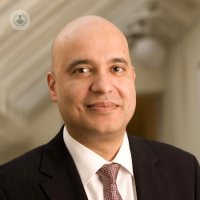What causes snoring? OSA and snoring solutions
Written by:Snoring. Lots of us do it, and for many people it is a completely normal phenomenon.
But did you know that, sometimes, snoring can negatively affect your sleep and, in turn, make you tired during the daytime and affect both your mental and physical health?
Renowned ENT surgeon, Professor Guri Sandhu, explains obstructive sleep apnoea.

Why do people snore?
Snoring is caused by the soft tissues in the throat and palate and the back of the tongue vibrating as we breathe. These tissues may vibrate when the individual sleeps in certain positions (usually on the back, but in some people it can occur in any position).
Snoring is more common in older people, as the tissues become looser, making them more likely to vibrate. Other factors that can cause snoring or make it worse include:
- Drinking alcohol
- Having a blocked nose
- Tiredness
- Obesity/being overweight – greater bulk can lead to narrowing of the airways.
Simple snoring rarely causes severe problems; however sleep-related breathing disorders can vary from light snoring to episodes of obstructed breathing, which are indicative of obstructive sleep apnoea.
What is obstructive sleep apnoea (OSA)
Apnoea is defined as when the muscles and soft tissues in the throat relax so much that they totally block the airway for a minimum of 10 seconds. Hypopnoea is a less severe episode where the airway is partially blocked, reducing airflow by half for at least 10 seconds.
Obstructive sleep apnoea (OSA) is a sleep disorder in which the patient suffers repeated episodes of apnoea and hypopnoea while sleeping, in severe cases occurring as often as every minute.
Obstructive sleep apnoea in children
The main cause of OSA in children is enlarged tonsils and adenoids. OSA can have serious consequences for the child’s development and health, leading to:
- Poor cognitive function
- Behavioural problems
- Impaired growth (children grow most during deep sleep; poor quality sleep caused by sleep apnoea can stunt this process)
- Even bedwetting or soiling
Obstructive sleep apnoea in adults
In adults, obstructive sleep apnoea can cause the following symptoms:
- Tiredness during the day
- Poor mental function
- Strain on the heart and lungs over time
Treatment for snoring and OSA
Treatment depends on the patient. The first thing for overweight patients is to lose weight, which often provides a solution to snoring without needing to be referred to an ENT specialist. Once referred, the ENT specialist will examine the nose, mouth, throat and larynx carefully to find where the airway is vibrating and if it is becoming obstructed.
Possible treatments include:
- Medical treatment
- Surgery on the nose
- Surgery on the palate
- Mandibular advancement prosthesis – similar to a gum shield, it is worn at night to hold the lower jaw forward, keeping the airway open.
If the doctor suspects OSA, a sleep study may be carried out either at the patient’s home or in a hospital. If the patient is confirmed to have OSA, they will be referred to a respiratory doctor who specialises in sleep-related breathing disorders.
Many OSA patients are given a CPAP (continuous positive airway pressure) device – a sort of sleep mask that holds the upper airways open, preventing obstruction, while continuously pumping air through the nose. CPAP devices can lead to patients feeling more awake and energised during the day due to improved quality of sleep.
Visit PrOFESSOR Sandhu's Top Doctors profile for more information or to book an appointment


